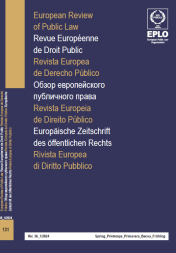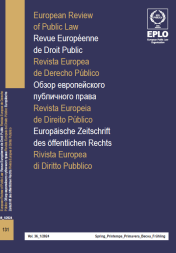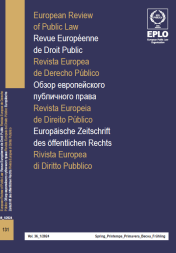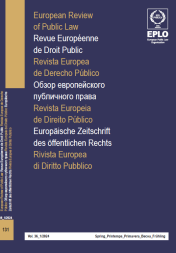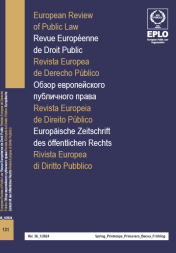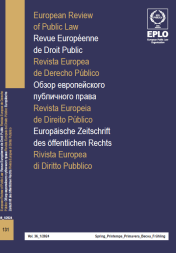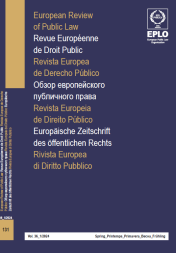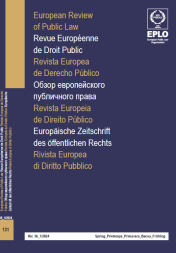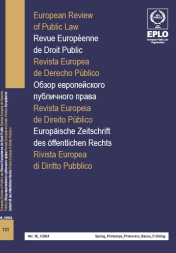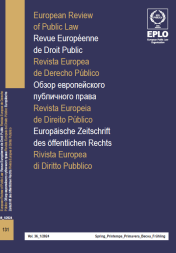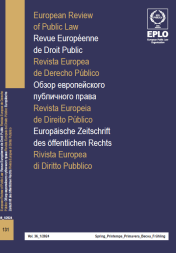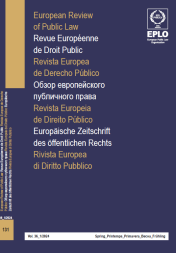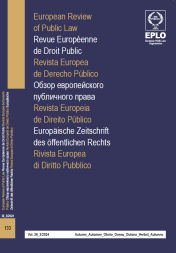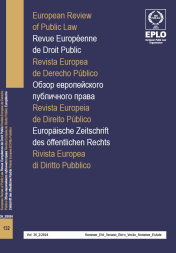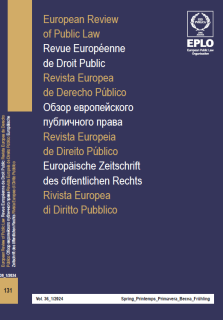
ERPL, vol. 36, no 1, spring/printemps 2024 (131)
This ERPL issue comprises the proceedings of the EGPL Annual Reunion 2023, which was held from the 15th to the 16th of September 2023, on the subject “Digital Transformation: Technology, Fundamental Rights, Public Administration”.
The issue features papers by eminent scholars from around the world contributing to the debate on this topical subject and it follows the themes of the Conference sessions, that is: “Technology and Fundamental Rights – Digital Constitutionalism”; “Technology and Fundamental Rights – Artificial Intelligence”; “Technology and Public Administration – Digital State”. The issue also comprises papers on the Workshops held within the framework of the Conference on the themes “The Social Digital State. The Right to Education as an Example”, “Digital Citizenship and Public Services: Urban Planning and Dematerialization of the Administration” and “Essential State Functions in the Age of Digitalization: Business, Human Rights and Constitutionalism”.
Session: “Technology and Fundamental Rights – Digital Constitutionalism”
The first paper posits that huge technological advances of the last decades precede, guide and oblige the legislator instead of the opposite. It considers that ineffective protection of fundamental rights is an indicator of institutional corruption in the sense that either the institution does not fulfill its mission or it is so perceived by the public, and emphasizes the role of the Mass and Social Media in the dynamics of this equation. The author concludes that access to impartial and independent courts is the only guarantee that democracy will prevail.
The second article analyzes the case law of the ECtHR in the context of digital rights to assess whether and to what extent the response of the Court to the new digital challenges could be considered effective and accurate. The ECtHR has developed a rather significant jurisprudence in the field of digital rights, either by adapting the former case law to the new digital world or by creating new concepts, principles, and rights, such as the concept of data protection, the principle of minimization, and the right to be forgotten. However, the paper concludes, the insufficiencies and lacunae of the Convention in the digital rights context remain and might be well prevented if the legal framework were more evolved and established.
Session: “Technology and Fundamental Rights – Artificial Intelligence”
The first paper in the framework of this Session aims to analyze the relationship between European regulation of AI and public values when public authorities are concerned. As the AI Act of the European Union applies to both private entities and public administrations, the latter increasingly employing AI systems, public authorities are obligated to adhere to rules in their actions that differ from those applicable to private entities, aimed at ensuring the transparency of their actions, the participation of interested private parties, the justification of decisions (duty to give reasons), equality, proportionality, and decisions’ reviewability.
The next paper on the theme of the same Session aims to explore the dynamic regulatory landscape surrounding artificial intelligence (AI) within the European Union. By tracing the evolutionary path from initial soft-law measures to the current shift towards a comprehensive legislative approach, the article provides valuable insights into the multifaceted dimensions of AI regulation. The analysis focuses on the EU’s proposal for AI regulation, examining its key aspects and delving into the nuanced complexities introduced by recent amendments, sheds light on the intricate balance policymakers seek between fostering innovation and safeguarding against potential risks associated with AI technologies and takes a broader perspective, exploring the global context of AI regulation.
Again on the theme of this Session, the third paper analyzes the basis of competence, the scope of application, and the requirements for the use of AI systems in public administration, and places the AI Act in the context of other EU and Member State regulations. The European Union has established comprehensive regulations for AI technologies with the AI Act, as there are many possible applications in public administration that are intended to improve the quality of decisions and save on personnel but there are also risks associated with this, such as discrimination and a lack of justification.
The next article deals with the concept of “trustworthy AI”, the theoretical concept on which the AI Act - the world’s first set of rules to regulate the development and use of AI - is based. This article takes a closer look at this approach and shows the extent to which a comparable approach was already contained in earlier legal acts of “European data law”.
The last article completing this Session proposes two lines of thoughts aimed at updating the catalog of human rights in light of the potential and risks of AI (mainly Machine Learning). The first considers the adaptation of certain traditional principles (informed consent and non-discrimination) to the challenges posed by AI. The second covers four new rights, built upon the specific characteristics of AI systems, with the aim of effectively addressing AI pros and cons.
Session: “Technology and Public Administration – Digital State”
The first article under this Session investigates the ways in which technologies are influencing public institutions and their functioning, with particular regard to the contemporary and ‘democratic’ model of the state that was established in the 20th century. A first group of influences concerns the modes of exercising sovereignty and, in particular, the fundamental functions of the state. A second group of conditioning refers to the effects that the technological revolution has on the other two elements of the state, the people and the territory. From these constraints emerges a model based on ‘surveillance’, in which big data, their use and protection have acquired a strategic role. The digital revolution, the dominant role of Big Tech and social network, and the increasing use of artificial intelligence are profoundly affecting public institutions and civil society: what is the future of the (digital) State?
The next article on this theme wants to reveal the limits of AI in law and argues that AI is an empirical creature that does not project normativity in the world of law. For this, the author focuses on a nuclear feature of law: legal argumentation, and specifically analyzes the use of automated decision-making systems in the justification of administrative acts. The aim is not to assimilate AI to legal norms, neither to find its accommodation in the normative system; it is rather claimed that the normative content (in practical terms) of legal reasoning will determine the use we make of AI in law.
The third and last article within the framework of this Session seeks to address the stage of Digital Justice and the use of Robot Judges in Brazil, and the growing use of Artificial Intelligence (AI) within the Brazilian Judicial Branch, at the state, federal and national levels. It also deals with the controversy regarding the international or national regulation of Artificial Intelligence, including within the regulation by the Brazilian National Council of Justice (NCJ).
A contribution on the theme of the Conference follows, which explores Ukraine’s strategic response to the Russian invasion in February 2022, particularly its use of cloud technologies to safeguard state information systems and registries. This article serves not only as an analysis of the specific situation in Ukraine, but also as a platform for understanding general trends in the use of cloud solutions to strengthen digital infrastructure and sovereignty in the face of geopolitical tensions.
The Section on the Workshops held within the framework of the Conference follows:
The first paper in this Section presents the European Commission’s Legal Service and the book on 70 Years of EU Law: A Union for its Citizens, which the Legal Service published to celebrate 70 years of EU law. Inspired from the fifth chapter of the book, the paper also discusses how EU law regulates data protection in a rapidly changing technological environment. It concludes with some final thoughts on recent cases that could be seen as precursors to the regulation of artificial intelligence.
The next paper, within the framework of “The Social Digital State. The Right to Education as an Example” Workshop, proposes that both teaching technology and teaching about technology in other subjects should include an ethical and legal dimension, as appropriate to the age of pupils. Additionally, the paper puts forward the right to non-digital education.
The second paper on this theme evaluates the new challenges and opportunities arising from artificial intelligence (AI) and information and communication technologies (ICTs), that have also been extended to education. After presenting the challenges for teachers on the one hand and for the state as a public service provider on the other hand, and taking into consideration children’s rights, the author poses the question: In case the right to education implies the right to be safe, and be protected during school hours, does safe school environment include protection from online threats and if so, who is responsible for students’ online safety?
The last paper on this theme addresses the topic of using artificial intelligence in education, in the context of the act for artificial intelligence, exposing elements of liability and responsibility in its development and use taking into consideration that the evolution of digitization and the use of artificial intelligence on a large scale determine an adaptation of the educational system, a better understanding of the new role of the teacher in using technologies, combined with the strengthening of ethical principles in education.
The first paper within the framework of the Workshop on “Digital Citizenship and Public Services: Urban Planning and Dematerialization of the Administration” asserts that dematerialization of the submission of applications, of the evaluation and of issuing of urban planning authorizations is not only a technological problem. This modernization of the administrative action, which became a reality in France on 31 December 2021, was faced with numerous legal constraints, some of which of constitutional nature, as this dematerialization could only be set up in line with the competences of administrative authorities, in particular the principle of free administration of local authorities, and the fundamental rights of citizens.
The second paper on this theme deals with the dematerialization of urban planning documents in France, influenced by the European Directive INSPIRE of 2007 concerning access to documents on the application of environmental policies. In this context, France created the “national portal for urban planning” in 2023, requiring municipalities to put their local urban plans (PLU) on line, although this dematerialization has faced legal and technical obstacles. Dematerialization, albeit considered a step forward, poses challenges related to the complexity of reconciliating European and national objectives.
The first paper within the framework of the Workshop on “Essential State Functions in the Age of Digitalization: Business, Human Rights and Constitutionalism” summarizes legal arguments regarding essential functions in the context of innovation, digitalization, and the platform economy, focusing on the nature of the relationship between the state and technological revolution. The paper puts forward arguments framed to fit the context of a ‘Regulation Revolution’ describing sudden and sometimes sweeping surges of regulation in response to the increased spread of disruptive technologies. It also examines the role of the state and enumerates certain essential state functions that remain important.
The second paper on this theme, taking as a starting point the rapid progression of technology, particularly the digital revolution, which resulted in unprecedented challenges for constitutionalism, maintains that as platform capitalism rises, constitutional democracies grapple with algorithmic governance, necessitating the preservation of human expertise. The central constitutional dilemma lies in addressing threats posed by transnational private entities, balancing individual freedoms with the need for intervention to uphold fundamental rights in a horizontally evolving constitutional landscape. The shift from restraining government powers to regulating global tech impacts defines the intricate challenge facing modern constitutionalism in the algorithmic society.
The following paper on the same theme explores the regulation of hate speech on Facebook in the context of the freedom of expression. It examines the legal and ethical considerations involved in regulating hate speech on Facebook and also discusses the role of social media companies like Facebook in addressing hate speech, and the criticisms and concerns surrounding their policies and practices. The paper suggests ways which could contribute to mitigate the “delete first, ask questions later” mentality and promote more thoughtful moderation practices.
Last but not least, the following paper on this theme comments on businesses, human rights, and ESG reporting. The European Commission adopted on 21 April 2021 an ambitious and comprehensive package of measures to help improve the flow of money towards sustainable activities across the European Union. Based on the Corporate Sustainability Reporting Directive (CSRD), entered into force on 5 January 2023, EU law requires all large companies and all listed companies to disclose information on their risks and opportunities arising from social and environmental issues, and on the impacts of their activities on people and the environment. Currently, problems in the quality of sustainability reporting create an accountability gap, but common standards introduced by the EU are expected to help.
This ERPL issue concludes with Information on the EGPL Annual Reunion 2023, and on the 27th meeting of the EGPL acting as the European Scientific Council of the European Public Law Organization.
Summary
Foreword [IN ENGLISH AND IN FRENCH] (4 pp.)
Part I
Technology and Fundamental Rights – Digital Constitutionalism
I. Karkalis, Of the People, By the People, For the People; Without the People? Digital Government, Fundamental Rights and Institutional Corruption [IN ENGLISH] (16 pp.)
A. M. Guerra Martins, Digital Rights in the European Court of Human Rights’ Case Law [IN ENGLISH] (27 pp.)
Technology and Fundamental Rights – Artificial Intelligence
B. Marchetti, Artificial Intelligence and Public Authorities: Does the European AI Act Protect Public Values? [IN ENGLISH] (24 pp.)
A. I. Saavedra-Bazaga, Navigating the EU Regulatory Landscape on Artificial Intelligence: Complexities and Debates in Public Law [IN ENGLISH] (28 pp.)
A. Pilniok, European Governance of AI in Public Administration [IN ENGLISH] (28 pp.)
J. Eichenhofer, Trustworthy AI and Fundamental Rights [IN ENGLISH] (16 pp.)
C. Casonato, Unlocking the Synergy: Artificial Intelligence and (Old and New) Human Rights [IN ENGLISH] (13 pp.)
Technology and Public Administration – Digital State
L. Casini, The Future of the (Digital) State [IN ENGLISH] (54 pp.)
L. Moral Soriano, Empirical Creatures in a Normative World: AI and Law [IN ENGLISH] (35 pp.)
S. J. Casali Bahia, Digital Justice, Robot Judges and New Challenges and Perspectives for the Justice: Issues Posed by AI in the Brazilian Court System [IN ENGLISH] (14 pp.)
Part II
Contribution
Yu.O. Voloshyn / A.V. Paziuk, The Pivotal Role of Cloud Technologies in Ukraine’s Wartime Resilience: A Case Study in Digital Sovereignty and Innovation [IN ENGLISH] (8 pp.)
Part IIΙ
Workshops
Book Presentation: “70 years of EU law: A Union for its citizens”, edited by the Legal Service of the European Commission
A. Bouchagiar, 70 Years of EU Law: A Discussion on the Protection of Personal Data in a Rapidly Changing Technological Environment [IN ENGLISH] (10 pp.)
The Social Digital State. The Right to Education as an Example
P. Meix Cereceda, The Right to Education in the Age of Digital Technologies [IN ENGLISH] (11 pp.)
B. L. Balla, The Challenges of AI and ICTs in Education concerning Rights and Duties [IN ENGLISH] (11 pp.)
G. L. Ispas, The Use of Artificial Intelligence Systems in Education. Regulation and Liability in Use [IN ENGLISH] (11 pp.)
Digital Citizenship and Public Services: Urban Planning and Dematerialization of the Administration
N. Foulquier, Urban Planning Authorizations and Dematerialization in France [IN FRENCH] (10 pp.)
M. Chapouton, The Dematerialization of Urban Planning Documents [IN FRENCH] (9 pp.)
Essential State Functions in the Age of Digitalization: Business, Human Rights and Constitutionalism
M. Sulyok, Essential State Functions and Digitalization in the Age of the ‘Regulation Revolution’ [IN ENGLISH] (10 pp.)
S. Bácsfalvi, Constitutionalism in the Era of Platform Capitalism [IN ENGLISH] (8 pp.)
D. Medvegy, The Regulation of Hate Speech Committed on Facebook in the context of the Right to Freedom of Expression [IN ENGLISH] (11 pp.)
Zs. Ráczi, Businesses, Human Rights and ESG Reporting [IN ENGLISH] (10 pp.)
Information [IN ENGLISH AND IN FRENCH] (7 pp.)
















